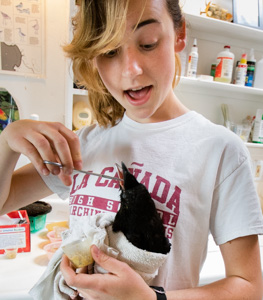How to Volunteer at Native Animal Rescue
Volunteers are the backbone of Native Animal Rescue. Native Animal Rescue is a great place for people who are passionate about wildlife conservation. Volunteering at Native Animal Rescue is a powerful and extremely satisfying experience.
NAR’s need for volunteers varies with the seasons. During the baby season from about mid-March through September, NAR needs many volunteers to help care for the hundreds of orphan animals we receive. This includes rescuing, feeding, and cleaning (laundry and kennel washing).
- The very young baby birds need to be fed every 15 minutes during the day.
- The young mammals need to be fed every 2-3 hours during the day and night.
We “hire” most of our new volunteers in March and April when we have our trainings to teach them how to feed and care for baby wildlife. Once we have trained volunteers for the baby season, we will often close applications for the season.
Volunteers who are “hired” after the baby season, start out rescuing and/or cleaning. Some of these volunteers continue doing these tasks until the following spring when they get trained to care for the baby animals.
To be a Native Animal Rescue volunteer, you must:
- complete the Native Animal Rescue volunteer application below
- be at least 18 years of age*
- work within Native Animal Rescue’s guidelines
- understand that the goal of Native Animal Rescue is to release animals into the wild
- attend a one four hour training session per year in order to provide direct animal care or to rescue or transport animals
- sign NAR’s Release of Liability and Indemnity Agreement
- if you will be using your car to rescue or transport animals, you must provide Proof of Insurance as evidence you meet California requirements for car insurance
*Children who are 16 and 17 can volunteer if the parent or guardian provides written permission.
*Children who are under 16 can volunteer if they are accompanied by an adult.
Volunteer Opportunities
Many types of volunteer activities are available, but some of them are seasonal and only available in the spring and/or summer. After looking over the following brief descriptions of our volunteer activities, please complete the online volunteer application form.
Animal care shifts. Feed animals, clean cages, and receive incoming animals at NAR on 17th Avenue. Each shift is three to four hours long, on the same day and time each week. We will provide four hours of training and supervised instruction as needed. You must take the Animal Care Training in April to volunteer for a shift. The season lasts from May through August.
Cleaning. Do various cleaning jobs including scrubbing and hosing out plastic kennels, helping with the laundry, sweeping, and mopping. Each shift is two to three hours long, on the same day each week. We’ll instruct you on the job.
Data Entry. Enter the information from the animal intake sheets into a specialized computer program. Each shift is two to three hours long, on the same day each week. We will teach you on the job.
Animal home rehabilitation (aka Fostering). Rehabilitate orphaned native animals at your home. Your home needs to be a safe environment for the animals, and you need to have an adequate amount of time available in your schedule for their care. We will provide hands-on training and all the materials necessary. When the animals are young, they need to be fed every three to four hours. As they mature, they need to be fed twice a day. Animal rehabilitation can take from two to four months, generally between March and August.
Building enclosures. Regularly, NAR’s animal enclosures need to be repaired or rebuilt, and sometimes a new one needs to be built. NAR provides all the materials and follows the Fish and Wildlife guidelines for enclosure construction.
Fundraising. Join a new committee that develops community activities and events to increase awareness of Native Animal Rescue and raise funds to enable Native Animal Rescue to provide the best possible care to local wild life throughout Santa Cruz County. Hours are flexible.
Rescuing injured and orphaned animals. According to your stated availability, we will ask you to rescue an injured or orphaned animal that has been reported to NAR’s hotline. We provide training and give you a net, a transport kennel, towels, etc. You must provide Proof of Insurance as evidence you meet California requirements for car insurance.
Transporting animals. Transport animals in your private vehicle from the NAR center on 17th Avenue to various home rehabilitation centers located in Boulder Creek, Watsonville, or Gilroy. Longer trips are sometimes required from Santa Cruz to the International Bird Rescue Center in Fairfield. Round trips range from 36 to 200 miles. We will provide training. You must provide Proof of Insurance as evidence you meet California requirements for car insurance.

